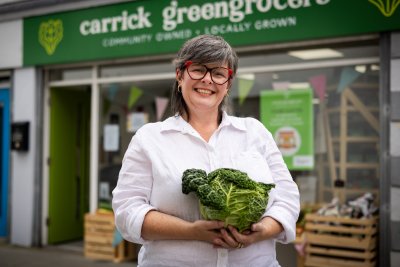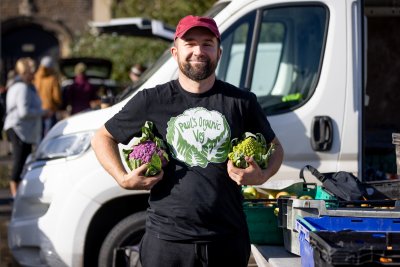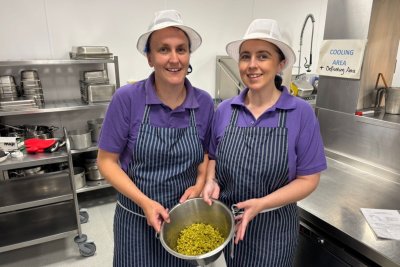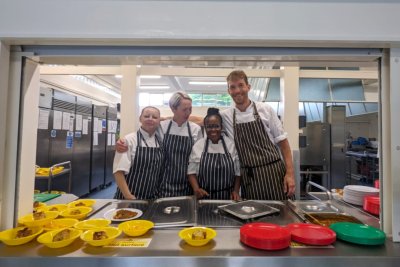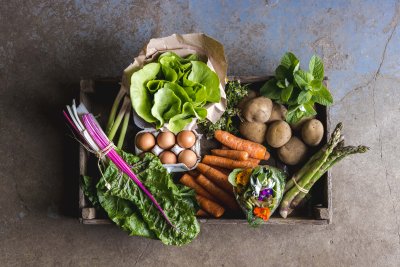Millions of UK schoolchildren, hospital patients, workplaces and restaurant diners are to be served only demonstrably sustainable fish, thanks to the pledge [1] signed today by Brakes, the UK's largest food wholesale supplier [2].
The Sustainable Fish Cities pledge commits Brakes to a suite of measures which will ensure that all their general sale, own brand fish and seafood products are from verifiably sustainable sources [3]; protecting precious marine environments and supporting sustainable fishermen and farmers.
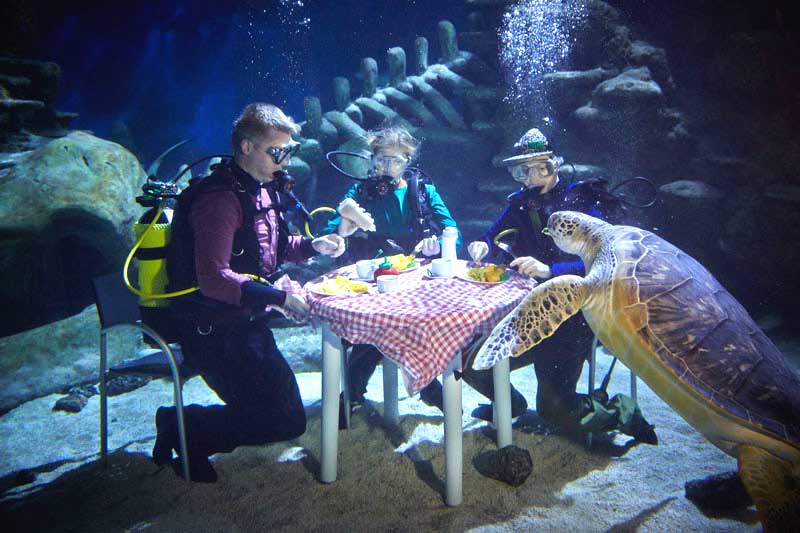
Brakes’ new fish sourcing policy means that with immediate effect Brakes have stopped sourcing products considered endangered according to the Marine Conservation Society’s Good Fish Guide (rated ‘5’), and committed to removing or resourcing all species rated ‘4’ within 12 months. Brakes will also clearly identify which products are most sustainable by applying the MCS’s 1-3 rating on their online product directory to help customers make the best choices. The number of Marine Stewardship Council (MSC) Certified products has also increased [5].
The pledge is a major boost to the Sustainable Fish Cities campaign, which aims to see only verifiably sustainable fish on menus in the UK, and is now active in 14 towns and cities across the UK’s Sustainable Food Cities network [6]. Each local campaign is gathering fish commitments from schools, councils, universities, hospitals, workplaces and iconic venues. With sustainable fish now the norm for thousands of Brakes customers in these sectors, today’s news is expected to lead to many more pledges across the network.
Ruth Westcott, Sustainable Fish Cities Project Officer at Sustain, explains:
“This commitment is truly ground-breaking. It means that Brakes’ customers don’t actually need to know the ins and outs of seafood sustainability to make a good choice - the responsibility has been taken by their supplier.”
“It is vital that the foodservice sector takes fish sourcing seriously - people are eating more fish than ever when they eat out and it is simply unacceptable that they should be able to choose an endangered fish from a menu in the UK. I am delighted to welcome Brakes as a Sustainable Fish Cities signatory in what feels like a significant turning point in the industry.”
Adam Swan, Category Director at Brakes, says:
“We are proud to be the first national fish supplier in the UK to commit to the Fish Cities pledge, giving Brakes customers unprecedented access to sustainable fish.”
“The commitment will help caterers following important initiatives in their sectors such as schools’ “Food for Life” or the new Hospital Foods Standard as well as supporting our group and independent customers’ own sustainability claims. The new commitment means that customers buying Brakes products can meet their sustainability criteria and be confident in their supply chains [7].”
“We hope our pledge will encourage our customers and the industry to sign up and help protect fish stocks.”
To mark the occasion, the pledge was signed at an event on 14 May at the SEA LIFE London Aquarium. The ceremony, in association with Young’s Seafood, featured a series of talks and sustainable fish advice from experts at the Marine Stewardship Council (MSC) and Marine Conservation Society (MCS). To show their support, SEA LIFE London Aquarium’s divers took to the depths of the million litre Ocean Display to tuck in to a traditional Friday fish supper, surrounded by dozens of resident fish, turtles and sharks.
Brakes’ new fish policy means:
- From today, Brakes will not source any species on the MCS ‘Fish to Avoid’ list (those considered to be endangered or caught using very destructive fishing methods) for use in their general sale, own brand range.
- Customers will be able to choose from the widest range of MSC ecolabelled products of any UK fish and seafood supplier, after Brakes were named MSC Fish Supplier of the Year in 2014.
- Fish ratings will be displayed on Brakes’ online product directory to help customers make sustainable, informed choices.
- Brakes’ staff will receive training on sustainable fish to help advise customers on the best choices and ‘top swaps’
- ENDS -
For more information about Sustainable Fish Cities and how to get involved, contact:
Ruth Westcott
Sustain
0203 5596 777
ruth@sustainweb.org
For more media information contact Nexus PR:
Phil Slaney
phil.slaney@nexuspr.com
020 7052 8839
Daniele Humphreys
danielle.humphreys@nexuspr.com
020 7052 8847
Notes to editors
[1] Sustainable Fish Cities is a campaign aiming to end overfishing by transforming the way fish is served and celebrated across towns and cities in the UK. It is convened by Sustain: The alliance for better food and farming, alongside marine conservation and food organisations working on sustainable seafood issues including Fish2Fork, the Marine Conservation Society; Marine Stewardship Council; Pisces Responsible Fish Restaurants; The Sustainable Restaurant Association.
So far caterers serving over 500 million meals per year have committed to the pledge standards. Find out more here: https://www.sustainweb.org/sustainablefishcity/
[2] About Brakes Group - Brakes Group is a leading supplier to the foodservice sector in the UK, Ireland, France and Sweden. The group comprises a family of specialist businesses that are able to deliver everything the caterer needs, including their very successful own brand ranges developed specifically for chefs.
Brakes Group supplies a diverse customer base, which includes independent pubs, restaurants and hotels, schools, hospitals, contract caterers and well known national chains.
Brakes Group has developed a clear customer focus and a strong understanding of the needs of the foodservice sector providing innovative products and services and is committed to improving both the communities and environment it serves.
Brakes is the largest wholesale supplier in the UK, with 10,000 employees and 62 depots. It sells over 50 million fish fingers alone each year.
[3] Brakes are committing to serving 100% demonstrably sustainable general sale, own brand fish & seafood, according to the following criteria:
- Removal of MCS rated 5 species ‘Fish to Avoid’ – at the point of signing the pledge.
- Removal of MCS rated 4 species ‘Fish to Eat Very Occasionally’ – within one year of signing the pledge.
- Promoting the Best – serving MCS 1 and 2 species or MSC certified species wherever possible.
Brakes’ full sustainable fish policy can be found here.
[4] Species rated ‘Fish to Avoid’ are considered the least sustainable fish to eat because they are endangered and/or caught using the most destructive fishing methods, and the Marine Conservation Society recommend that they should be avoided, see http://www.fishonline.org/fishfinder?min=5&max=5&fish=&avoid=1. These species are no longer being purchased by Brakes for use in their general sale, own brand range. However, some stock may still exist in the supply chain as frozen products have long shelf lives, and Sustain does not condone food wastage.
The Marine Conservation Society is a charity working to protect the seas, wildlife, and beaches in the UK. They produce ‘FishOnline’, a simple rating system which gives fish-buyers a guide to the species which are the best choices for sustainability. Fisheries are rated on a scale of 1-5 from sustainable to unsustainable. Species rated as 5 are coloured red and considered ‘Fish to Avoid’. Those rated 1 and 2 are coloured green and considered ‘Fish to Eat’.
[5] The Marine Stewardship Council is an ecolabelling organisation which sets an international scientific standard for sustainable fishing. Fisheries undergo a rigorous assessment, and those that pass are recognised with the blue fish-tick ecolabel. About 10% of global fisheries are either certified or in assessment.
[6] The Sustainable Food Cities network is an alliance of public, private and third sector organisations using food as a vehicle for positive change. It is coordinated by Food Matters, Soil Association and Sustain, and is funded by the Esmee Fairbairn Foundation. www.sustainablefoodcities.org
[7] How will Brakes’ commitment help caterers?
Sustainable fish are included in the criteria for a number of initiatives across all sectors of foodservice. Brakes new commitment makes it easier for caterers across all sectors to comply:
Local Authorities; Including schools, council staff restaurants, community meals, and food outlets in public buildings.
- The Food for Life catering mark. The criteria for sustainable fish are: BRONZE – no fish rated ‘5’; for SILVER & GOLD points are awarded for each percent of spend on MSC Certified fish. More information can be found here: http://www.sacert.org/catering.
- Schools must serve fish as a requirement of the new School Food Standards, and the standards also recommend that the fish should be sustainable. The standards can be found here: http://www.schoolfoodplan.com/standards/.
- Schools have the added benefit that Brakes will manage MSC Chain of Custody for them. The Local Authority goes through a simple auditing process, and then the schools are able to take part in the Fish and Kids project, a marine sustainability education programme, and use the MSC ecolabel on menus.
Hospitals
From April 2015, Health Trusts must ensure all seafood is traceable to the fishery; demonstrably sustainable; and complies with the UN FAO Code of Conduct for Sustainable Fisheries. Put simply, hospitals need to choose fish which is Marine Stewardship Council certified, or rated 1-2 by the MCS.
Universities
- Serving sustainable fish now helps universities to score points in the People and Planet Green League.
- There is a unique system for gaining MSC Chain of Custody Certification for Universities which are members of the TUCO Purchasing Organisation. It allows the University to use the MSC ecolabel on menus and prove that the fish is from a sustainable source.
Sustainable Fish Cities works as follows:
- Businesses are asked to sign a simple pledge, committing them to serving 100% demonstrably sustainable fish.
- Across a city, pledges must be gathered from i) Local Authorities, ii) Hospitals, iii) Universities, iv) Workplaces and v) Restaurants, and a star is awarded when enough pledges are gathered in each sector.
- If enough pledges are gathered across the town or city, it can be crowned a 5-star Sustainable Fish City.
Caterers serving well over 500 million meals per year have already committed to the sourcing policy upon which the Fish Cities pledge is based. A list of these, as well as the cities involved in the campaign can be found here: https://www.sustainweb.org/sustainablefishcity/
Sustainable Fish: A campaign to protect precious marine environments and fishing livelihoods, and call for fish to be bought from sustainable sources. We want to show what can be done if people and organisations make a concerted effort to change their buying habits.

